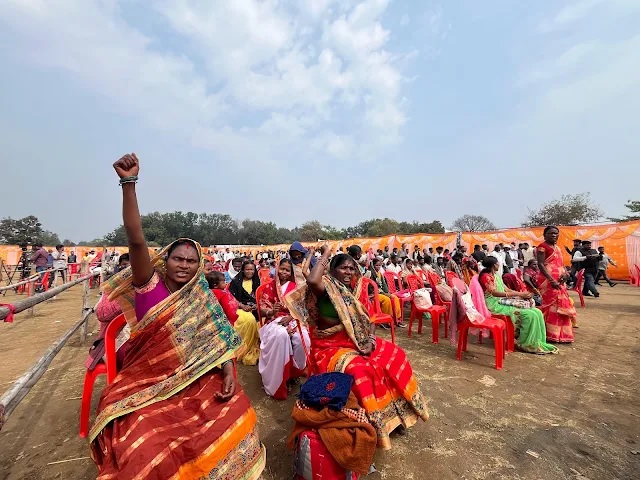Rural workers from several States, participating in a public hearing organised in Jharkhand, have regretted that the Union Government’s rural jobs guarantee scheme is posing numerous challenges in their daily life, yet the authorities have failed to listen to their plight. Speaking at the platform provided by NREGA Sangharsh Morcha and Jharkhand NREGA Watch, Mahavir Parhaiya from Latehar (Jharkhand) said that for the last two years, he has not been getting regular work under NREGA in his village and the payment for the work has also not been made on time.
Phool Kumari from Katihar in Bihar gave the instance of her her village, where 76 people demanded work, but hardly 7 got work. Bholu Pando and Sevak Lakra from Chhattisgarh said that the introduction of NREGA brought revolutionary changes in their lives, but due to continuous budget cuts and the introduction of digital attendance, it is becoming very difficult to work under NREGA.
The Jan Sunwai (public hearing) on the National Rural Employment Guarantee Act (NREGA), where NREGA workers from various non-party trade unions and mass organisations from Jharkhand, Bihar, Uttar Pradesh and Chhattisgarh participated, saw Congress leaders and Jairam Ramesh and Kanhaiya Kumar as chief guests accusing the Government of India of creating unnecessary technical complexity into NREGA in the name of transparency.
Others participating in the event were Rameshwar Oraon, Alamgir Alam , Mazdoor Kisan Shakti Sangathan leder Nikhil Dey, “Chaupal” editor Gangaram and James Herenj and Balram from the Jharkhand NREGA Watch.
Kanhaiya Kumar said that this country was built by the workers and without workers the country will not prosper. He added that, if the current Union government can waive off the loan of capitalists amounting to Rs 14 lakh crores, then it should also guarantee the rightful work and wages of crores of NREGA workers.
Senior leader and former Jharkhand Rural Development Minister Alamgir Alam said that the Jharkhand State Government wrote several letters to the Union Government questioning the logic in paying NREGA workers less than the statutory agricultural wage rate and promised that the State would put pressure on the Union Government to withdraw digital attendance.
Jairam Ramesh recalled the struggle behind the NREGA Act and outlined its objectives, adding that the current Union Government is bringing unnecessary technical complexity into NREGA in the name of transparency, which is in violation of the people’s right to work. He stressed that the main objective of the Union Government is to end NREGA.
He also suggested that after Rajasthan, Jharkhand could be the second state where urban employment guarantee should be implemented. He urged that it is the duty of public representatives to participate in such public hearings and take collective decisions, keeping in mind the ground reality.
Economist Jean Dreze, while showing a fish from the pond built by NREGA workers, said that NREGA is an investment that has brought prosperity among the rural poor. On behalf of NREGA Sangharsh Morcha and Jharkhand NREGA Watch, Gangaram Paikra, Balram and James Herenj presented a Charter of Demands:
Guarantee 100 days work per adult (vyask) person in a family.
NREGA wage rate should be Rs 800.
Pressure should be put on the central government to pay wages within 15 days as per NREGA law.
The Union Government should follow the order of the Supreme Court in the Swaraj Abhiyan case and pay the pending compensation.
Do not make Aadhar Based Payment System (ABPS) mandatory for payments.
Digital attendance in NREGA should be stopped immediately.
Adequate budget should be allocated for social audit and the autonomy of the social audit department should be maintained. In the social audit of every work, it should be done as per the rules of CAG, keeping all the information before the Gram Sabha.
In the name of Section 27 of the NREGA Act, the injustice being done to NREGA workers of West Bengal should be stopped. Section 27 should be amended so that such injustice does not happen to other states.
There is a provision of unemployment allowance in the NREGA Act if work is not found within 15 days, but it is not followed. The central government should take responsibility that the workers get unemployment allowance.
Every person in every family should get 100 days of work in a year.
For the empowerment of the Gram Sabha, it is necessary that the decisions of the Gram Sabha be given priority in the determination and implementation of schemes.
Urban Employment Guarantee Act should be brought in the entire country so that every hand actually gets work and gets full wages for the work.
Courtesy: CounterView
